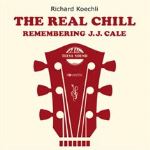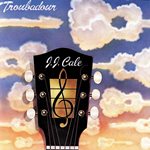

John Weldon "J. J." Cale (December 5, 1938 – July 26, 2013) was an American guitarist, singer, and songwriter. Though he avoided the limelight, his influence as a musical artist has been widely acknowledged by figures such as Mark Knopfler, Neil Young and Eric Clapton, who described him as "one of the most important artists in the history of rock". He is considered to be one of the originators of the Tulsa Sound, a loose genre drawing on blues, rockabilly, country, and jazz. In 2008, Cale, along with Clapton, received a Grammy Award for their album The Road to Escondido.
John Cale was born on December 5, 1938, in Oklahoma City, Oklahoma. He was raised in Tulsa, Oklahoma, and graduated from Tulsa Central High School in 1956. As well as learning to play the guitar he began studying the principles of sound engineering while still living with his parents in Tulsa, where he built himself a recording studio. After graduation he was drafted into military service, studying at the Air Force Air Training Command in Rantoul, Illinois. Cale recalled, "I didn't really want to carry a gun and do all that stuff so I joined the Air Force and what I did is I took technical training and that's kind of where I learned a little bit about electronics." Cale's knowledge of mixing and sound recording turned out to play an important role in creating the distinctive sound of his studio albums.
Along with a number of other young Tulsa musicians, Cale moved to Los Angeles in late 1964, where he found employment as a studio engineer as well as playing at bars and clubs. He managed to land a regular gig at the increasingly popular Whisky a Go Go in March 1965. In 1966, while living in the city, he cut a demo single (in those days professional demos were actual 45 rpm vinyl singles) with Liberty Records of his composition "After Midnight". He distributed copies of the single to his Tulsa musician friends living in Los Angeles, many of whom were successfully finding work as session musicians. He found little success as a recording artist and, not being able to make enough money as a studio engineer, he sold his guitar and returned to Tulsa in late 1967, where he joined a band with Tulsa musician Don White.
In 1970 it came to his attention that Eric Clapton had recorded a cover of "After Midnight" on his debut album. It was suggested to Cale that he should take advantage of this publicity and cut a record of his own. His first album, Naturally, released in December 1971, established his style, described by Los Angeles Times writer Richard Cromelin as a "unique hybrid of blues, folk and jazz, marked by relaxed grooves and Cale's fluid guitar and iconic vocals. His early use of drum machines and his unconventional mixes lend a distinctive and timeless quality to his work and set him apart from the pack of Americana roots music purists."
In his 2003 biography Shakey, Neil Young remarked, "Of all the players I ever heard, it's gotta be [Jimi] Hendrix and J. J. Cale who are the best electric guitar players." In the 2005 documentary To Tulsa and Back: On Tour with J.J. Cale, Cale's guitar style is characterized by Eric Clapton as "really, really minimal" adding "it's all about finesse".
His biggest U.S. hit single, "Crazy Mama", peaked at #22 on the U.S. Billboard Hot 100 chart in 1972. In the 2005 documentary film To Tulsa and Back, Cale recounts the story of being offered the opportunity to appear on Dick Clark's American Bandstand to promote the song, which would have moved it higher on the charts. Cale declined when told he could not bring his band to the recording and would be required to lip-sync the words.

Cale moved to California in 1980 and became a recluse, living in a trailer without a telephone. His 1983 album #8 was poorly received and he asked to be released from his contract with PolyGram. When later asked how he had spent the 1980s he replied: "Mowing the lawn and listening to Van Halen and rap."
Cale often acted as his own producer / engineer / session player. His vocals, sometimes whispery, would be buried in the mix. He attributed his unique sound to being a recording mixer and engineer, saying, "Because of all the technology now you can make music yourself and a lot of people are doing that now. I started out doing that a long time ago and I found when I did that I came up with a unique sound."
His catalogue is published by independent music publishers Fairwood Music Imternational.
Cale died at the age of 74 in San Diego, California, on July 26, 2013, after suffering a heart attack. He was survived by his wife Christine Lakeland, whom he married in 1995.

Text is available under the Creative Commons Attribution-ShareAlike License.
Date: October 2020.
Photo Credits:
(1) J.J. Cale,
(2ff) Richard Koechli
(unknown/website).